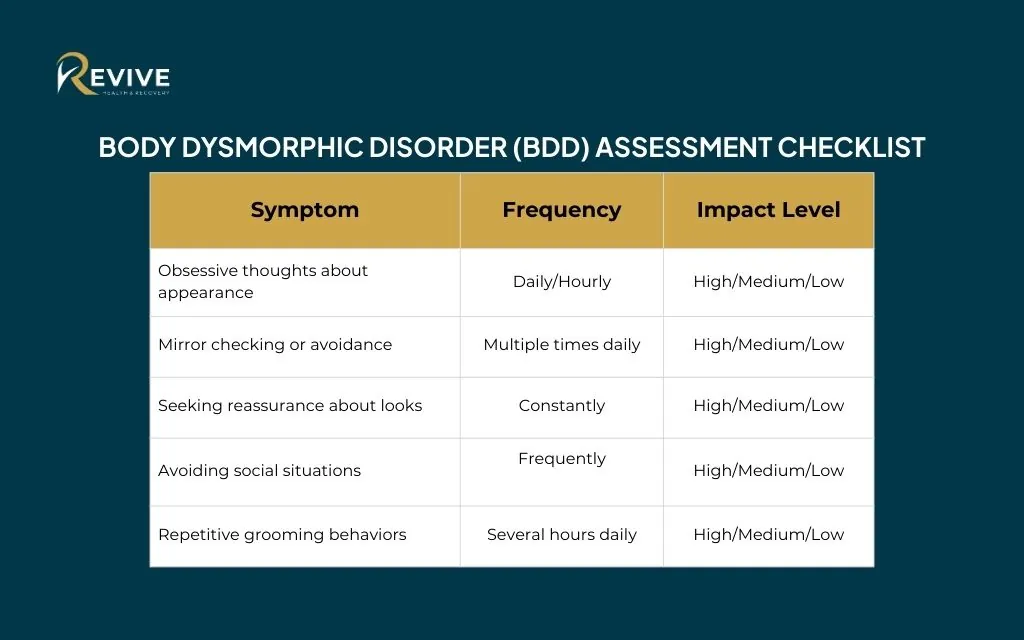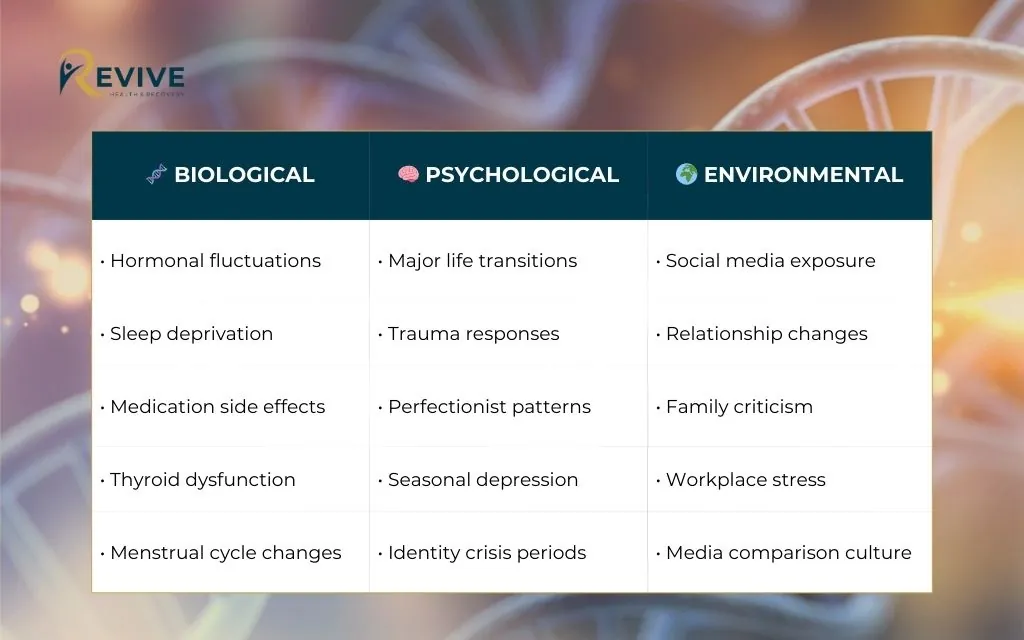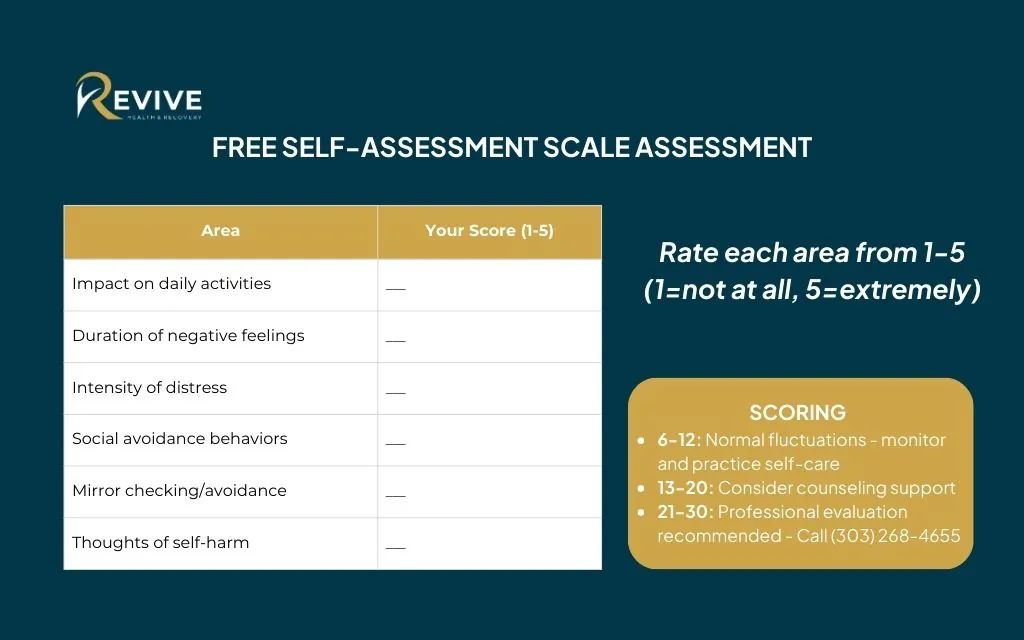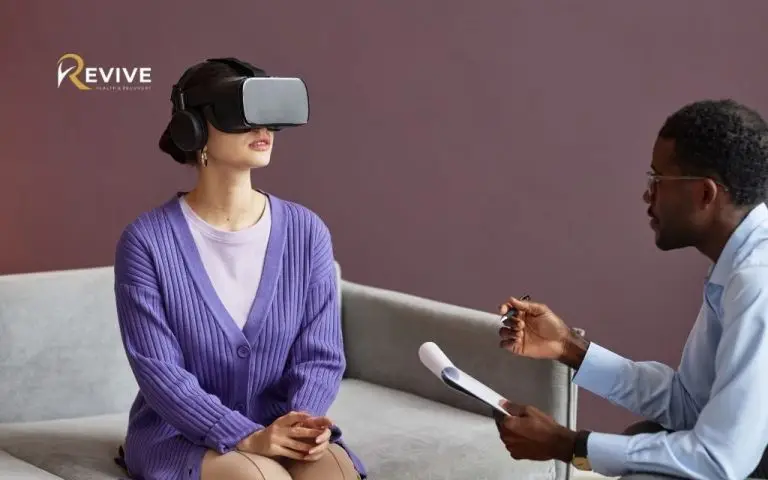Feeling suddenly unattractive can shake your world. One day you feel fine, the next you avoid mirrors and wonder “why do i feel so ugly all of a sudden?” This jarring shift affects millions of people across all ages and backgrounds.
You’re not imagining things. These feelings stem from real psychological and physiological changes happening in your mind and body. Whether triggered by depression, hormonal fluctuations, or social pressures, sudden negative self-perception deserves attention and care.
The good news? These feelings are treatable and temporary. Understanding the science behind why this happens gives you power to reclaim your confidence. At Revive Health Recovery, we’ve helped countless individuals navigate these challenging emotions and rebuild their self-worth.
This article explores evidence-based reasons for sudden appearance distress and provides practical strategies for recovery. Your journey back to self-acceptance starts with understanding you’re not alone in this experience.
The psychology behind sudden negative self-image
Your brain processes self-image through complex networks involving perception, emotion, and memory. When something disrupts these systems, you might suddenly think “i feel so ugly” even when nothing physical has changed.
Understanding body dysmorphic disorder (BDD)
Body Dysmorphic Disorder affects how you perceive your appearance. Unlike normal appearance concerns, BDD involves intense preoccupation with imagined or minor physical flaws. You might spend hours examining yourself in mirrors or avoiding them completely.
BDD Assessment Checklist:

If you check 3+ high-impact symptoms, contact Revive Health Recovery at (303) 268-4655 for professional evaluation.
Sudden onset BDD can emerge during stressful life periods. Research shows neurochemical imbalances affecting serotonin levels often trigger these episodes. The condition affects approximately 2% of the population, with many cases going undiagnosed.
The depression-body image connection
Depression fundamentally alters how you see yourself. When depression strikes, your brain’s visual processing centers can distort perception, making you appear different in mirrors and photos.
Neurochemical factors play a crucial role. Depression reduces serotonin and dopamine levels, chemicals that regulate mood and self-perception. This creates cognitive distortions where you focus exclusively on perceived flaws while ignoring positive features.
Studies demonstrate that 60% of people with depression experience significant body image concerns. The brain’s attention bias shifts toward negative self-evaluation, creating a cycle where you feel increasingly unattractive despite objective appearance remaining unchanged.
Social comparison theory in action
Humans naturally compare themselves to others. In today’s digital age, social media amplifies these comparisons exponentially. You’re constantly exposed to filtered, edited images that create unrealistic beauty standards.
Social media algorithms specifically promote content that generates engagement, often favoring posts that trigger emotional responses. This exposure can suddenly shift your self-perception, especially during vulnerable periods.
Cultural beauty standards vary dramatically across societies and time periods. What’s considered attractive today differs vastly from previous generations, proving beauty is largely constructed rather than objective.
Common triggers for sudden appearance distress
Understanding your triggers helps target appropriate treatment approaches:

Biological and hormonal factors
Your hormonal system directly influences mood and self-perception. Menstrual cycles cause estrogen and progesterone fluctuations that affect neurotransmitter levels. Many women report feeling less attractive during certain cycle phases.
Thyroid dysfunction significantly impacts mental health and body image. Both hyperthyroidism and hypothyroidism can cause mood changes, weight fluctuations, and altered self-perception. These conditions often develop gradually, making diagnosis challenging.
Sleep deprivation severely disrupts emotional regulation. When you’re exhausted, your brain struggles to process visual information accurately, often leading to negative self-evaluation.
Psychological stressors
Major life transitions create identity uncertainty. Starting new jobs, ending relationships, or moving locations can trigger questioning of self-worth and appearance. These periods of adjustment often coincide with appearance anxiety.
Trauma responses frequently involve body disconnection. Past experiences of criticism, abuse, or rejection can resurface unexpectedly, causing sudden appearance distress. Your nervous system may interpret current situations through past trauma lenses.
Seasonal Affective Disorder affects mood and self-perception during darker months. Reduced sunlight exposure disrupts circadian rhythms and serotonin production, often triggering appearance concerns alongside other depressive symptoms.
Social and environmental triggers
Relationship changes significantly impact self-worth. Breakups, rejections, or social conflicts can trigger sudden appearance anxiety. Your brain may interpret social difficulties as evidence of physical unattractiveness.
Workplace stress creates additional pressure on appearance and performance. Competitive environments or criticism from supervisors can spark sudden self-doubt about professional image and personal attractiveness.
Media exposure constantly reinforces narrow beauty ideals. Advertising, entertainment, and news content repeatedly present specific appearance standards that most people cannot achieve naturally.
The science of self-perception distortions
Your brain uses shortcuts to process visual information quickly. Sometimes these shortcuts create distorted self-perception, especially during emotional distress.
Cognitive distortions affecting body image
| Distortion Type | Thought Example | Reality Check Question |
| All-or-Nothing | “I’m completely ugly today” | “Can beauty exist on a spectrum?” |
| Mental Filtering | “Everyone only sees my flaws” | “What positive features am I ignoring?” |
| Catastrophizing | “This pimple ruins everything” | “How important will this be tomorrow?” |
| Mind Reading | “People think I look terrible” | “What evidence do I have for this?” |
| Fortune Telling | “I’ll never be attractive” | “Can I predict the future accurately?” |
Neurological factors in body perception
Brain imaging studies reveal specific regions involved in self-image processing. The fusiform face area and superior temporal sulcus work together to create your internal appearance representation.
Mirror neuron dysfunction can affect how you perceive yourself compared to others. These neurons help you understand social cues and self-evaluation. When they malfunction, self-perception becomes distorted.
Visual processing differences in depression alter how your brain interprets mirror images and photographs. Depressed brains show reduced activity in areas responsible for positive visual processing.
Recognizing when it’s more than normal insecurity
Use this assessment to determine if professional help is needed:
FREE Self-Assessment scale assessment
Rate each area from 1-5 (1=not at all, 5=extremely):
| Area | Your Score (1-5) |
| Impact on daily activities | ___ |
| Duration of negative feelings | ___ |
| Intensity of distress | ___ |
| Social avoidance behaviors | ___ |
| Mirror checking/avoidance | ___ |
| Thoughts of self-harm | ___ |
Scoring:
- 6-12: Normal fluctuations – monitor and practice self-care
- 13-20: Consider counseling support
- 21-30: Professional evaluation recommended – Call (303) 268-4655

Warning signs requiring immediate professional help
| Warning Sign | Normal Concern | Requires Professional Help |
| Duration | Hours to days | Weeks to months |
| Daily Function | Minimal impact | Cannot work/socialize |
| Mirror Behavior | Occasional checking | Complete avoidance or obsessive checking |
| Response to Support | Improves with reassurance | Persists despite help |
| Self-harm thoughts | None | Any level of self-harm ideation |
Evidence-based strategies for recovery
Daily Recovery Action Plan
MORNING ROUTINE (10 minutes)
- Mirror practice: 2 minutes neutral observation
- Positive affirmation: “I am more than my appearance”
- Set intention: Focus on one non-appearance goal
AFTERNOON CHECK-IN (5 minutes)
- Thought challenging: Question one negative appearance thought
- Reality test: Ask “What would I tell a friend having this thought?”
- Redirect focus: Engage in meaningful activity
EVENING REFLECTION (10 minutes)
- Gratitude practice: List 3 non-appearance qualities you appreciate
- Connection: Reach out to supportive friend or family member
- Self-care: One nurturing activity for your well-being
Cognitive behavioral techniques
Thought challenging exercises help identify and modify distorted thinking patterns. When you think “i feel so unattractive” or feeling “why do i feel so ugly all of a sudden” examine evidence supporting and contradicting this belief. Often, you’ll discover the thought lacks factual basis.
Behavioral experiments test negative appearance beliefs against reality. Ask trusted friends for honest feedback or take objective photos to challenge distorted self-perception.
Mindfulness practices help observe appearance thoughts without judgment. Instead of fighting negative feelings, acknowledge them as temporary mental events that will pass naturally.
Lifestyle modifications for mental wellness
The Recovery Foundation Plan:
| Category | Daily Target | Weekly Goal |
| Sleep | 7-9 hours consistent schedule | Track sleep quality |
| Nutrition | Balanced meals, omega-3 rich foods | Meal prep Sunday |
| Exercise | 30 minutes movement | 3 structured workouts |
| Social Connection | One meaningful interaction | Plan social activity |
| Mindfulness | 10 minutes meditation | Try new mindfulness app |
Professional treatment options
Treatment Pathway at Revive Health Recovery:
STEP 1: Initial Assessment
↓
STEP 2: Personalized Treatment Plan
↓
STEP 3: Weekly Therapy Sessions (CBT/ACT focus)
↓
STEP 4: Integrated Wellness Support
↓
STEP 5: Long-term Maintenance & Skills Building
Therapy modalities specifically address body image concerns. Cognitive Behavioral Therapy (CBT) shows strong evidence for treating appearance anxiety and related depression. Acceptance and Commitment Therapy (ACT) helps develop psychological flexibility around appearance thoughts.
Support groups connect you with others experiencing similar challenges. Peer support reduces isolation and provides practical coping strategies from people who understand your experience.
Building long-term resilience and self-acceptance
Developing a healthy relationship with mirrors and photos
Progressive Mirror Exposure Plan:
- Week 1: 30-second neutral glances
- Week 2: 1-minute objective description
- Week 3: 2-minute acceptance practice
- Week 4: 5-minute self-compassion exercise
Practice describing what you see without judgment. Instead of “I look terrible,” try “I see brown eyes and dark hair.” This reduces emotional reactivity to your appearance.
Cultivating inner worth beyond appearance
Values-Based Living Exercise:
- Identify Core Values: What matters most to you beyond appearance?
- Daily Alignment: How can you honor these values today?
- Weekly Review: Did your actions reflect your values?
- Monthly Goal: Set one value-based objective
Strength and accomplishment recognition builds self-worth through achievements and personal growth. Keep a record of daily accomplishments, skills developed, and positive impact you make on others.
Service and contribution focus shifts attention from self-criticism to helping others. Volunteering, mentoring, or supporting friends creates meaning beyond appearance concerns.
Supporting loved ones through appearance distress
How to help someone feeling “ugly”?
DO:
- Validate their emotional experience
- Focus on their qualities beyond appearance
- Encourage professional help if needed
- Maintain consistent support and inclusion
DON’T:
- Argue about their appearance
- Give appearance-focused reassurance
- Minimize their feelings
- Make it about your own insecurities
Encouraging professional help becomes essential when distress persists or worsens. Research local mental health professionals and offer to help schedule appointments.
Why choose Revive Health Recovery for your mental wellness journey
Specialized expertise in body image and depression treatment
Revive Health Recovery’s licensed therapists receive specialized training in body dysmorphic disorder and depression treatment. Our team understands the complex relationship between mental health and self-image when you feel “Why do i feel so ugly all of a sudden”, offering evidence-based approaches including Cognitive Behavioral Therapy and mindfulness techniques.
Our personalized treatment plans address both symptoms and underlying causes of appearance distress. We recognize that each person’s experience is unique, requiring tailored interventions that consider individual history, triggers, and goals.
Comprehensive, holistic healing approach
We integrate mental health therapy with wellness practices that support whole-person recovery. Our approach goes beyond symptom management to address lifestyle factors, relationship patterns, and personal growth opportunities.
Our collaborative care model involves multiple therapeutic modalities working together. This comprehensive approach ensures all aspects of your well-being receive attention and support.
Convenient Denver location with flexible scheduling
Located at 1427 S Federal Blvd, Denver, CO 80219, Revive Health Recovery offers easy access for Colorado residents. We understand that seeking help can feel overwhelming, so we make the process as convenient as possible.
Flexible appointment scheduling accommodates work and family obligations. We also provide 24/7 support availability for crisis situations at (303) 268-4655, ensuring help is always accessible when you need it most.
Culturally sensitive care for Colorado communities
Our team understands unique pressures affecting Colorado residents, from outdoor lifestyle expectations to seasonal mood changes. We respect diverse backgrounds and individual treatment preferences while providing culturally responsive care.
Our community-focused approach recognizes the importance of local support systems in recovery. We help connect clients with resources and activities that support long-term wellness within their communities.
Outpatient excellence without hospital restrictions
Our specialized healing center environment promotes comfort and recovery while allowing you to maintain daily responsibilities. This outpatient model empowers independence while providing professional support.
We focus on developing coping skills you can use in real-world situations. This approach builds confidence and resilience that extends far beyond our treatment center.
FAQs about feeling ‘why do i feel so ugly all of a sudden?’
How long do sudden negative feelings about appearance typically last?
Duration varies significantly based on underlying causes and individual factors. Temporary episodes triggered by stress or hormonal changes may last days to weeks. However, persistent feelings lasting over a month often indicate need for professional evaluation. Revive Health Recovery helps identify causes and provides targeted treatment to accelerate recovery.
Can hormonal changes really affect how I see myself in the mirror?
Absolutely. Hormonal fluctuations during menstrual cycles, pregnancy, menopause, or thyroid disorders directly impact neurotransmitters affecting mood and self-perception. These changes can create genuine shifts in how you process visual information about yourself. Our Denver team specializes in addressing hormone-related mood and body image concerns.
Is it normal to feel ugly even when others say I look fine?
Yes, this disconnect between self-perception and external feedback is common in body image disturbances. Your brain may filter out positive input while amplifying perceived flaws. This doesn’t mean you’re imagining things – it indicates your perception systems need professional support. Revive Health Recovery offers specialized therapy to realign self-perception with reality.
What’s the difference between low self-esteem and body dysmorphic disorder?
Low self-esteem involves general negative self-evaluation across multiple areas. Body Dysmorphic Disorder specifically focuses on imagined or minor physical flaws with obsessive intensity. BDD includes repetitive behaviors like mirror checking and significant functional impairment. Our experienced therapists can properly assess and treat both conditions.
How can I help a teenager who suddenly thinks they’re ugly?
Validate their feelings without reinforcing negative beliefs. Avoid appearance-focused reassurance and instead emphasize their qualities beyond looks. Monitor for warning signs like social withdrawal or self-harm. Professional evaluation becomes crucial if distress persists. Revive Health Recovery provides adolescent-focused therapy and family support services throughout Colorado.
Conclusion
Wondering ‘Why do i feel so ugly all of a sudden” or feeling suddenly unattractive affects millions of people across all demographics. These distressing feelings stem from complex interactions between psychological, biological, and social factors. The important truth is that sudden negative self-image is both understandable and highly treatable.
Whether triggered by depression, hormonal changes, social pressures, or other factors, appearance-related distress responds well to professional intervention and evidence-based treatment. You don’t have to navigate these challenging emotions alone.
At Revive Health Recovery, we understand the intricate relationship between mental health and body image. Our compassionate team of licensed professionals specializes in helping individuals overcome appearance-related distress and build lasting self-acceptance. Located in Denver’s heart, we’re committed to supporting your journey toward mental wellness and renewed confidence.
Don’t let sudden negative self-perception control your life. Take the first step toward recovery by contacting Revive Health Recovery today. Call us at (303) 268-4655 or email contact@revivehealthrecovery.com to schedule your consultation. Your journey to healing and self-acceptance starts with a single phone call.



